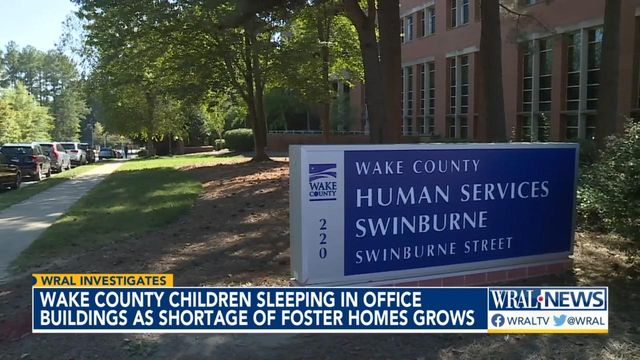'We're still in a crisis situation': Wake County foster kids still sleeping on floors of social services building
Home Sweet Hope founder Staci Stepp knows what it's like to have a rough childhood.
“I had a rough childhood,” Stepp said. “So, I wanted to use my gifts and talents to give back in the way that I can give back.”
Stepp founded the Mebane-based nonprofit five years ago. The nonprofit designs and builds dream rooms for foster kids in and around North Carolina.
“It’s everything from a new bed, a new dresser, a new rug,” Stepp said. “Pretty much everything you can think of that decorates a room.”
There are 10,200 kids in North Carolina stuck in an overloaded foster care system. At the same time, far fewer families are looking to foster. The issues have nonprofits and state leaders worried, as kids wait for a home that may never come.
How Wake County leaders are working to address the issues
Administrators at the Wake County Department of Social Services say there aren’t any easy answers. Dozens of kids are sleeping in office buildings.
The need for rooms has never been greater, according to Wake County Director of Child Welfare Sheila Donaldson.
“I would say we’re still in a crisis situation,” Donaldson said.
Donaldson has been sounding the alarm for more than a year now. The foster situation, both in Wake County and across the country, has only gotten worse.
Currently, Wake County has 410 foster children younger than 18 in its system. Wake County has just 95 foster families to try and take care of them.
“It is huge,” Donaldson said. “It is not enough.”
Donaldson says the issues go back to the pandemic.
At the time, foster parents were afraid to have children and staff coming and going for checks and visits. Remote schooling was a major burden. Also, many children began developing mental and behavioral issues.
However, with the end of pandemic lockdowns and restrictions, Donaldson said she's not sure why foster families haven't returned to the system.
“That’s a good question,” Donaldson said.
The Wake County Department of Social Services has been trying to fill the gap by turning to partner agencies, placing children with relatives and increasing recruiting, but it’s still not enough.
“We still find ourselves with a desperate need for foster homes in the community,” Donaldson said.
The result is 31 kids have been living in the Wake County Department of Social Services office at some point this year. Some kids lived there for months.
As of Thursday, Wake County leaders said there are currently no children sleeping in Wake County buildings.
“We have worked so hard for the kids to make things decent for them while they’re here, and even more than decent, make this a home,” Donaldson said. “And for some of them, they like being here, which is kind of sad that they like living in an office building.
“But they are forming relationships with the staff. They are able to go to school."
The department is currently working to hire another foster parent recruiter. Also, the department is considering hiring consultants. Plus, county leaders have looked around the country for any departments who’ve been able to find a solution to this national crisis.
“But there doesn't seem to be something obvious that seems to be working across the board,” Donaldson said.
How Home Sweet Hope has helped
Stepp and her Home Sweet Hope volunteers recently renovated two rooms at a Wake Forest home along Forgotten Pond Avenue for foster kids named Malaysia and Jamari.
Home Sweet Hope had a reveal for both kids.
“Oh, snap,” Jamari said. “Oh, this is cool. “
While Malaysia and Jamari live on Forgotten Pond Avenue, thanks to Home Sweet Hope, they are forgotten no longer.
“Not everybody can foster, but anybody can do something to help foster children,” Donaldson said.
State allocates funding for child welfare and family wellbeing
The state is investing $100 million it received from the federal government in exchange for expanding Medicaid in child welfare and family wellbeing. That includes more money for foster families.
However, it’s not clear yet when that money will reach local offices or how much of a difference it will ultimately make.
How to help, foster or adopt
The North Carolina Department of Health and Human Services has a website with information detailing the process of becoming a foster or an adoptive parent in North Carolina. It involves a thorough assessment and mutual selection process that includes home visits, interviews and criminal background checks.
North Carolina does not have a dual-licensure process. This means that there are two separate approval processes for foster care and adoption.
North Carolina law requires that foster parents are licensed by the NC Division of Social Services with families working through their local county DSS or a licensed private agency. Adoptive parents are approved through their local county DSS or a licensed private agency.
People who aren't able to foster or adopt can still help. Home Sweet Hope has a volunteer interest form. The nonprofit has several needs including, assembly, cleaning, design, electrical, fundraising volunteer, moving and lifting, organization, painting and others.












